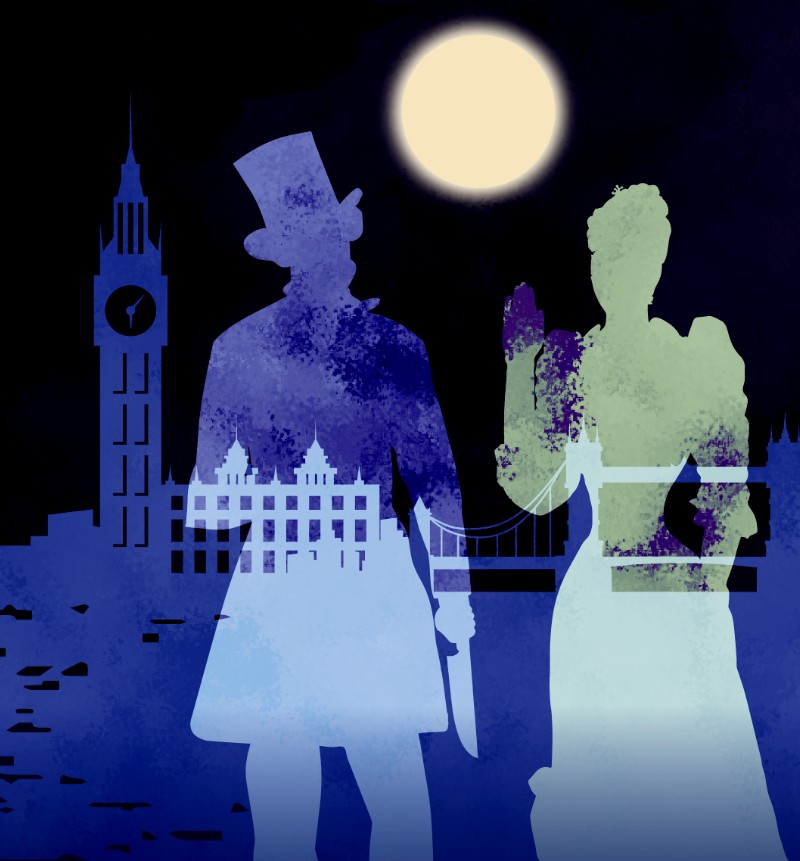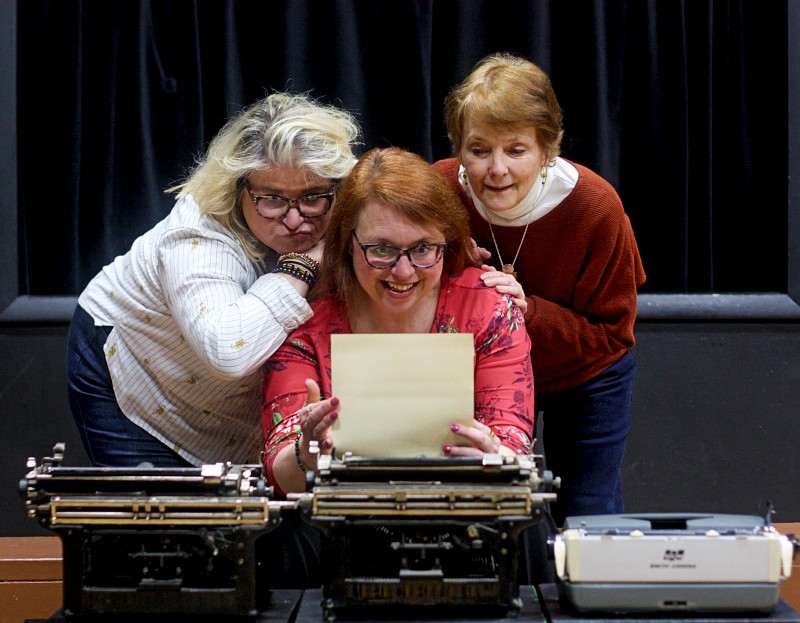"Marvin’s Room" walks a thin line between comedy and drama at Ann Arbor Civic Theatre

When the Ann Arbor Civic Theatre had to find a substitute for a previously announced play, Cassie Mann stepped in as director and suggested staging Scott McPherson’s Marvin’s Room, a play that walks that thin line between comedy and drama.
Two sisters have taken different paths in life. Bessie, now in her early 40s, left Ohio for Florida to be a caregiver for the last 20 years for her chronically ill father and an aunt confined to a wheelchair. She accepts her burden lightly but knows she’s missed a lot. Her sister Lee stayed in Ohio 20 years ago and never looked back. She is now the single mother of two teenage sons.
Bessie receives bad news from her doctor. She has leukemia and needs a bone marrow donor. Lee has to come to Florida to help her sister.
Sound heavy?
Cassie Mann calls it “one of the funniest plays about a serious subject I’ve encountered.”
Nick Shoulders & The Okay Crawdad Takes Country Music Back to Its Roots

Nick Shoulders doesn't think the stereotypical images of country music are sexy.
“We’re living in the same world as red scares, endless wars, pandemics, and bank failures that the origins of country music identified with,” said Shoulders, who's from Fayetteville, Arkansas. “The endless wars and the scary stuff that was forming early country music is far more of the reality I inhabit. That’s what I try to channel through in my craft. I’m not doing this because it's Civil War recreation stuff or because it’s mired in an experience that’s really far away. It’s still with us.”
After going viral during the pandemic with a performance of his track, “Snakes and Waterfalls,” Shoulders has become a beloved token of the best the country/Americana genre has to offer. Having now amassed over 3 million views, the video features Shoulders in his true nature: in the middle of the forest, singing (and yodeling) on a tree stump alongside his dog.
In 2019, Shoulders released his first full-length album Okay, Crawdad after his 2018 EP, Lonely Like Me. And last year, Shoulder released his fourth record, All Bad, a live-recorded, 14-track showcase of Shoulders at his best. The record was released via Gar Hole Records, the label Shoulders founded and co-owns, and is the first album released with his former band, The Okay Crawdad, since their pandemic hiatus.
Shoulders is a staple in the current “pseudo-new wave” of Americana/country music that’s been a dominant genre for years now. But with the help of platforms like TikTok, certain songs are lassoing in fans whose only prior exposure to country music might be to the sterile, strangely sexualized tunes that dominate the top charts. But with this success, Shoulders grapples with the cultural challenges the genre faces.
Love, Grief, Class, and Cancer: A.H. Kim's “Relative Strangers" reimagines a Jane Austen plot set in modern-day California

The details of who knows whom, and what happened in their pasts, result in drama in Ann Arbor author A.H. Kim’s retelling of Sense and Sensibility through her new novel, Relative Strangers, set in modern-day California.
Kim was an attorney and worked at a Fortune 200 company before retiring to write full-time. She raised her family in San Francisco, is a cancer survivor, and now lives in Ann Arbor with her husband. Kim will be in conversation with Camille Pagán at Literati Bookstore on Tuesday, April 2, at 6:30 pm.
The parallels to Jane Austen’s novel are revealed in the premise of the book.
Locals Rule: Highlighting the Washtenaw County creatives in the 62nd Ann Arbor Film Festival

The Ann Arbor Film Festival (AAFF) draws experimental filmmakers from across the world, but ever since it began in 1963 it's also made room for local creators to show their works.
The 62nd edition of AAFF is running March 26-31, and the fest's website and YouTube page have a ton of info, interviews, and articles about the hundreds of films that will be screened this year alongside dozens of social events, panels, and exhibitions.
But it's a lot. Like, a lot a lot, which means you would have to comb through a ton of material to figure out the creatives with local connections.
So, being the hyperlocal fans that we are, we did that for you and collected the events, screenings, and installations created by Washtenaw County-associated artists, curators, and film lovers who will have a moment to shine at the 2024 Ann Arbor Film Festival.
A Devilish New Comedy: David MacGregor's "The Antichrist Cometh" debuts at The Purple Rose Theatre

David MacGregor's plays have been performed in 15 countries, including India, Israel, South Korea, and Tasmania.
But the Michigan-born artist develops most of his world premieres right here at home.
Among the works the resident playwright for The Purple Rose Theatre Company debuted on the Chelsea stage are his Sherlock Holmes trilogy, Vino Veritas, Gravity, Consider the Oyster, The Late Great Henry Boyle, and his latest play, the hilarious The Antichrist Cometh, which begins previews there on March 22 and opens March 29.
John, an advertising exec, hasn’t seen Duncan, his old college roommate, for years. John and his wife, Lili, have Duncan and his fiancée, Fiona, for dinner. Fiona is devoutly religious and notices things that bring her to a startling conclusion:
John is the Antichrist!
“The basic idea for this play occurred to me a long time ago," MacGregor says. "I’m not personally religious, but I’ve read the Bible and Koran because they’re such important and influential texts. The Book of Revelations says the Antichrist will arrive on Earth."
MacGregor named his protagonist John, referencing the Book of John and the letters of John, but says, “John is a regular everyday guy who gradually realizes he might be the Antichrist.”
Through the Grisly Maze: "Elizabeth Cree" is a puzzle-filled operatic mystery

As the opera begins, Elizabeth is hung for the murder of her husband, the playwright John Cree.
Is she guilty of poisoning him?
John is a serial killer, in the fashion of Jack the Ripper.
Or is he?
You’ll have about an hour and a half to solve the puzzles in Elizabeth Cree, which unravel in 29 scenes and over four timelines and include plays and vaudeville within an opera.
“It’s an interesting and complicated piece,” says Gregory Keller, who directs Unversity of Michigan opera students in this one-act chamber opera, sung in English, that runs March 21-24 at the Lydia Mendelssohn Theatre. Likening it to a hedge maze, he says, “We’re presenting it as a theatrical puzzle, a house of mirrors that the audience gets lost in and, maybe, found in. Each time you go into the maze, you make another connection.”
It’s so much so that conductor Kirk A. Severtson, who coordinates opera at U-M, says audiences who see it twice will delight in discovering Easter eggs, once they know what happened. “You have to see it more than once to get all the nuances,” he says.
But those who see it once will have a chance to figure out just what is happening, after observing three gruesome murders almost in front of their eyes: Keller opted to stylize the crimes, presenting them as Victorian shadow plays.
Six-Pack of Shorts: Ann Arbor Civic Theatre tackles David Ives' comedy anthology "All in the Timing"

When Bruce Morey was looking for a play to direct for the Ann Arbor Civic Theatre, he wanted a comedy that would engage a large cast and that wouldn’t be too time-consuming for cast members. Instead of one play, Morey found six plays in one package, David Ives’ All in the Timing.
“I wanted to do a comedy that didn’t have any heavy issues about it, just fun,” he said. “All in the Timing is a series of 10-minute plays and I wanted to explore 10-minute plays, which I think is great for community players because you can put a lot of people into these plays if you do it right. They’re shorter, so for people who work full time and have lives outside of theater, this is a great experience for them because they can come in and do a 10-minute play or a 15-minute play and maybe it’s their first experience with it. It’s self-contained and ideal for community players.”
The Ann Arbor Civic Theatre will present Ives’ six-pack of short comedies, March 14-17 at the Arthur Miller Theatre in Ann Arbor.
Director Morey and producer Nicole Arruda are working together on producing and directing.
U-M law professor Barbara McQuade fights against disinformation in her new book

When Barbara McQuade, a University of Michigan law professor and MSNBC legal analyst, prosecuted a doctor who “cured” cancer in patients who didn’t have cancer, some victims refused to believe they’d been duped. They had trusted their doctor, after all, and how could they have been so wrong?
In her new book, Attack From Within: How Disinformation Is Sabotaging America, which she will discuss at the Ann Arbor District Library on March 7, McQuade uses many examples from history, here and abroad, to show us just how disinformation works.
In her comprehensive page-turner, McQuade also pulls theories from top political scientists, stories from FBI agents and other experts, and even Greek mythology, weaving them into a coherent argument that just may save our democracy.
U-M Writer-in-Residence Caroline Harper New's poetry book “A History of Half-Birds" unfolds time and explores human-animal interplay

“Control is a delicate science,” writes Caroline Harper New in her poetry collection, A History of Half-Birds. This book won the 2023 Ballard Spahr Prize for Poetry as selected by Maggie Smith.
New is a Writer-in-Residence at the University of Michigan and a U-M alumna with an MFA in Writing. She will read and be in conversation with poets Abigail McFee and Maia Elsner on Thursday, February 15, at 6:30 p.m. at Literati Bookstore.
A History of Half-Birds examines destruction from both natural events and human actions. The consequence is that a person’s life—or an animal’s life—is no longer the same. Since “We study the past to know the future,” there is no forward movement in these poems without probing what happened previously, whether that is Amelia Earhart’s disappearance or a reimagined Wizard of Oz in which Dorothy repeats “there’s no place like home anymore” amidst alligators.
This poetic investigation finds that pain and love are intertwined during these trials. A songbird that appears dead awaits its burial, but when the poet is ready to place it in a newly dug grave, the bird has vanished. This different type of loss brings new emotions. The poet implores that “I need you / to know I would have kept you, and loved you / most, had you never escaped my hands.” The past, present, and future are tinged with wondering what could have been if details had been altered.
The Gulf Coast storms raging throughout this collection are out of control, but they do not only consist of fury because “our lemon trees bloomed most brilliantly post-hurricane.” Specks of light also emerge. All people can do is name what they see, as the poem “Garden of Eve” suggests:
Insulation Versus Isolation: U-M's production of “Arbor Falls” holds a mirror to society's divisions

Caridad Svich’s play Arbor Falls is set in a small, landlocked, tree-lined town of that name. We know little about the town, save that it is near another place where something terrible happened, and the people of Arbor Falls want to feel safe. We know, too, that it is home to a church with a dwindling congregation and a preacher unsure of his faith.
In one scene, the preacher says they don’t think about what to say in their sermon but what to leave out. In this play, much is left out, too. Only one character is named other than by title (Preacher, Lover, Owner), and none have specific genders; pronouns are gender neutral. The dialogue—short lyrical lines, lacking in detail—also leaves a lot for the actors and director to imagine.
Into Arbor Falls comes a stranger, a traveler nobody knows, who makes “odd” sounds when praying. Preacher offers them safe harbor and food. But who is this stranger? Can they be accepted here?
“I’ve been really excited about the way the cast and production team have embraced the project,” says Tiffany Trent, chair of the University of Michigan’s Department of Theatre and Drama and director of Arbor Falls, which makes Michigan premiere on February 15 at Lydia Mendelssohn Theatre.
For Trent, a major theme is insulation versus isolation.


































